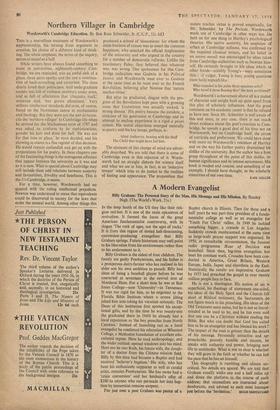Northern Villager in Cambridge
Wordsworth's Cambridge Education. By Ben Ross Schneider, Jr. (C.U.P., 32s. 6d.)
*f
cr an se re p1 tic 4le so ar SC {If bE ar ci he w fo sh p of th as SI] th cp.
cc or -us is a marvellous treatment of Wordsworth's prenticeship, his turning from argument to eation, his choice of a different kind of think- g. The whole emphasis, the terms of the inquiry, ems as sound as a bell.
While writers have always found something to sist in universities, eighteenth-century Cam- ridge, we are reminded, was an awful sink of a ace, three parts apathy and the rest a combina- an of back-scratching and careerism. The dons early loved their politicians. And undergraduate iciety was full of violence, snobbery under arms, td so full of affectation that `obscenity itself,' imeonc said, 'was grown effeminate.' Very :finite intellectual standards did exist, of course, ised on the Newtonian canon in mathematics Id theology. But they were not the sort to recon- le the `northern villager' to Cambridge life when ; arrived for the Michaelmas term of 1787 and as asked , to . conform to its sophistications, )wder his hair and dress for hall. 'He was not r that time or place,' he soon decided, and his owing in exams is a fine register of that decision. e would remain outlandish and get on with the reparations for his poetry. In these chapters one the fascinating things is the outrageous affinities at appear between the university as it was and it is now. What is special about Cambridge may include these odd relations between austerity ld favouritism, frivolity and heartiness. This is e Ur-Cambridge, it seems.
For a time, however, Wordsworth had no tarrel with the ruling intellectual prejudices. ewton was understood to mean that equivalents luld be discovered in society for the laws that 'der the natural world. Among other things this produced a school of 'dissentients' for whom the main business of reason was to assert the common happiness, who attacked the official Anglicanism of the university and who argued in the country for a number of democratic reforms. Unlike the reactionary Paley, they believed that whatever was, was wrong. One spokesman for this Cam- bridge radicalism was Godwin in his Political Justice, and Wordsworth went over to Godwin at the same time as he went over to the French Revolution, believing after Newton that `nature teaches virtue.'
But after he graduated, disgust with the pro- gress of the Revolution kept pace with a growing sense that Godwinism was actually wicked, `a strong disease.' His poetry became the antidote, a criticism of his generation at Cambridge and its attempt to enclose experience in a rigid a priori system. His moral objections emerged naturally as poetry and the key image, perhaps, is : . . . blind Authority, beating with his Staff The Child that might have led him.
The elements of this change of mind are admir- ably described. We are told that there is some of Cambridge even in this rejection of it. Words- worth had no straight distaste for science itself and what we see in him, in fact, is an 'inductive temper' which tries to do justice to the realities of feeling and appearance. The proposition that nature teaches virtue is proved empirically, for
Mr. Schneider, by The Prelude. Wordsworth
made use of Cambridge in other ways too. He
held on for one thing to Hartley's psychological theories. His native austerity, his suspicion of urban or Cambridge softness, was confirmed by the required classical writers, and his belief in an anima mundi was encouraged by ideas taken from Cambridge authorities such as Newton him- self. He certainly brought to life ideas which, in other hands—notably Young's—were sometimes thin r id vulgar. Young is busy posing questions (now hotly topical) like Who rounded in his palm these spacious orbs? Who bowl'd them flaming thro' the dark profound?
Wordsworth's achievement above all is a matter of character and insight built up quite apart from this play of scholarly influences. And the great comment on his academic career is that he refused to have one. Since Mr. Schneider is well aware of this and since, in any case, there is not. much direct evidence about the poet's .reaction to Cam- bridge, he spends a good deal of his time not on
i
Wordsworth, but on Cambridge tself, the circus ' of curricula and preferment. We could have done with more on Wordsworth's retention of Hartley and on the way his further poetry draMatised his dislike of the university. But the author has a firm grasp throughout of the point of this dislike, its human significance and its intense seriousness. His book is modest and concise, and something of an example, I should have thought, to the scholarly minorities of our own time.
KARL MILLER






























 Previous page
Previous page